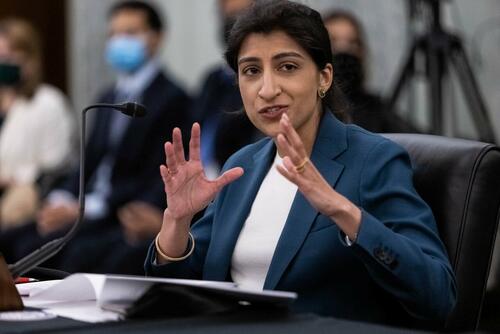
The FTC's socialist wunderkind and Liz Warren puppet, Lina Khan, has decided to cremate what little was left of her reputation, and after failing to break up even one "monopoly", moments ago the FTC announced it would extend its catastrophic track record by suing Amazon.com in a long-anticipated antitrust case, accusing the e-commerce giant of monopolizing online marketplace services by degrading quality for shoppers and overcharging sellers.
In a complaint filed in federal court in Seattle Tuesday, the FTC and 17 states accused Amazon of engaging in a course of conduct to exclude rivals in online marketplace services and stifle competition. The company was also accused of illegally forcing sellers on its platform to use its logistics and delivery services in exchange for prominent placement and of punishing merchants who offer lower prices on competing sites.
“Amazon is a monopolist and it is exploiting its monopolies in ways that leave shoppers and sellers paying more for worse service,” FTC Chair Lina Khan said in a briefing with reporters. “The stakes here are high. There is immediate harm that is ongoing. Sellers are paying $1 of every $2 to Amazon.”
In response, Amazon criticized the FTC’s lawsuit, saying it “is wrong on the facts and the law, and we look forward to making that case in court,” according to a post from David Zapolsky, Senior Vice President, Amazon Global Public Policy & General Counsel.
“If the FTC gets its way, the result would be fewer products to choose from, higher prices, slower deliveries for consumers, and reduced options for small businesses—the opposite of what antitrust law is designed to do,” Amazon said.
The suit is the fourth the agency has filed this year targeting Amazon, underscoring the determination of the Biden administration to put the growing concentration of corporate power, especially among Big Tech companies, at the heart of economic policy.
In May, the agency sued the e-commerce giant in two separate cases for failing to delete data about kids collected by its Alexa speakers and illegally spying on users of its Ring doorbells and cameras. Amazon said it disagreed with the FTC’s allegations, but agreed to pay $30.8 million to resolve the cases. One month later, the FTC again sued Amazon in a consumer protection case, alleging the company duped consumers into signing up for Prime membership and deliberately made it hard to cancel — echoing longstanding complaints from consumer watchdogs. Amazon denies the allegations, and that suit is ongoing.
The latest case represents a career-defining moment for Biden’s FTC puppet, 30-something figurehead Lina Khan, who has long had Amazon in her sights. As a young law student, Khan wrote a paper arguing that the existing antitrust enforcement framework was poorly equipped to tackle the potential harm Amazon poses to competition. That's what got her the top antitrust job, ironic considering that it is Jeff Bezos' Washington Post that has been the most vocal Biden cheerleader in the past 7 years.
Amazon has pushed the FTC to recuse Khan from its case, citing her academic work and prior statements about the company. It has also accused the agency of harassing founder Jeff Bezos and the company’s Chief Executive Officer Andy Jassy with document and interview requests.

The FTC is separately investigating Amazon’s proposed $1.65 billion acquisition of Roomba vacuum maker iRobot Corp. as are European antitrust authorities. In July, the companies renegotiated the price of the deal as the regulatory reviews remain ongoing.
“If we succeed, competition will be restored and people will benefit from lower prices, better quality,” Khan said Tuesday.
In retrospect, Amazon longs may be better served not to fight the lawsuits: Khan is best known for not only being incompetent, but also effectively working on behalf of company shareholders, as the WSJ discussed over the weekend in "The Hedge Fund That Made a Killing Betting Against Lina Khan"
The FTC’s socialist wunderkind and Liz Warren puppet, Lina Khan, has decided to cremate what little was left of her reputation, and after failing to break up even one “monopoly”, moments ago the FTC announced it would extend its catastrophic track record by suing Amazon.com in a long-anticipated antitrust case, accusing the e-commerce giant of monopolizing online marketplace services by degrading quality for shoppers and overcharging sellers.
In a complaint filed in federal court in Seattle Tuesday, the FTC and 17 states accused Amazon of engaging in a course of conduct to exclude rivals in online marketplace services and stifle competition. The company was also accused of illegally forcing sellers on its platform to use its logistics and delivery services in exchange for prominent placement and of punishing merchants who offer lower prices on competing sites.
“Amazon is a monopolist and it is exploiting its monopolies in ways that leave shoppers and sellers paying more for worse service,” FTC Chair Lina Khan said in a briefing with reporters.
“The stakes here are high. There is immediate harm that is ongoing. Sellers are paying $1 of every $2 to Amazon.”
In response, Amazon criticized the FTC’s lawsuit, saying it “is wrong on the facts and the law, and we look forward to making that case in court,” according to a post from David Zapolsky, Senior Vice President, Amazon Global Public Policy & General Counsel.
“If the FTC gets its way, the result would be fewer products to choose from, higher prices, slower deliveries for consumers, and reduced options for small businesses—the opposite of what antitrust law is designed to do,” Amazon said.
The suit is the fourth the agency has filed this year targeting Amazon, underscoring the determination of the Biden administration to put the growing concentration of corporate power, especially among Big Tech companies, at the heart of economic policy.
In May, the agency sued the e-commerce giant in two separate cases for failing to delete data about kids collected by its Alexa speakers and illegally spying on users of its Ring doorbells and cameras. Amazon said it disagreed with the FTC’s allegations, but agreed to pay $30.8 million to resolve the cases. One month later, the FTC again sued Amazon in a consumer protection case, alleging the company duped consumers into signing up for Prime membership and deliberately made it hard to cancel — echoing longstanding complaints from consumer watchdogs. Amazon denies the allegations, and that suit is ongoing.
One might ask, why is Amazon such a target? As dominant as it is in online retail, it is not a monopoly. And it is just one of many players in overall retail. Consumers value Amazon and its Prime delivery. A recent Harris/Harvard poll showed that in 2021 the most trusted institution was the U.S. military. Amazon came in second. So why this obsession?
As Robert H. Bork Jr writes, Amazon is a target precisely because it is a consumer-friendly company par excellence: low prices, enormous selection, rapid delivery, combining value from music and movies to hair dryers and outdoor furniture. If that business model is illegal, then the 45-year-old consumer welfare standard can be jettisoned.
Any business can be hauled up on charges. And that’s the point of progressive antitrust – to control the private sector by holding every business in the thrall of government.
The latest case represents a career-defining moment for Biden’s FTC puppet, 30-something figurehead Lina Khan, who has long had Amazon in her sights. As a young law student, Khan wrote a paper arguing that the existing antitrust enforcement framework was poorly equipped to tackle the potential harm Amazon poses to competition. That’s what got her the top antitrust job, ironic considering that it is Jeff Bezos’ Washington Post that has been the most vocal Biden cheerleader in the past 7 years.
Amazon has pushed the FTC to recuse Khan from its case, citing her academic work and prior statements about the company. It has also accused the agency of harassing founder Jeff Bezos and the company’s Chief Executive Officer Andy Jassy with document and interview requests.

The FTC is separately investigating Amazon’s proposed $1.65 billion acquisition of Roomba vacuum maker iRobot Corp. as are European antitrust authorities. In July, the companies renegotiated the price of the deal as the regulatory reviews remain ongoing.
“If we succeed, competition will be restored and people will benefit from lower prices, better quality,” Khan said Tuesday.
In retrospect, Amazon longs may be better served not to fight the lawsuits: Khan is best known for not only being incompetent, but also effectively working on behalf of company shareholders, as the WSJ discussed over the weekend in “The Hedge Fund That Made a Killing Betting Against Lina Khan“
Loading…



